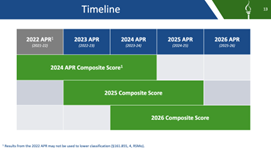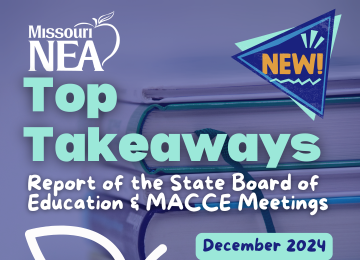1) Report on the Missouri School Improvement Program (MSIP) 6 Annual Performance Report (APR) Release
DESE delivered a report on the recent MSIP APR release for the State Board as a discussion item, with no action necessary at this time. DESE stated that the board will have an Action Item in January 2025 to classify school districts based on Superintendent Certification, Reserve fund balance, local board member orientation/training, and compliance with state and federal law. Classification will not be rooted in this year’s MSIP 6 APR composite score, which was initially stated in the timeline DESE presented last December. The rationale behind this shift in the timeline is that this composite score includes 2022 data, which “shall not be used to lower a public school district's accreditation” (161.855, 4, RSMo).
 “The Association…believes that a high-quality structure of accountability functions best when it is separate from high-stakes testing and accreditation. A separate structure of accountability encourages schools to focus on improvement” (A-4).
“The Association…believes that a high-quality structure of accountability functions best when it is separate from high-stakes testing and accreditation. A separate structure of accountability encourages schools to focus on improvement” (A-4).
2) Report on Language Essentials for Teachers of Reading and Spelling (LETRS) Program Evaluation
Dr. Stacy Pries with Preis Consulting through the University of Missouri-Columbia delivered the second LETRS program evaluation since the program’s inception. Dr. Preis looked at the total number of educators trained through Regional Professional Development Centers (RPDC). Participating teachers in Volume I of the program increased by 1,000 teachers from the first year of implementation. The evaluation tools used were a teacher survey, pre- and post-test of the program, and student achievement data from literacy assessments and ELA MAP. There were 150 LEAs missing in the literacy assessment data; this is due to the NWEA Reading Assessment data not being reportable to the state–NWEA is also no longer accepted as an approved reading assessment vendor in Missouri schools.
Key takeaways from the program evaluation includes: “LEA and teacher participation in LETRS training increased in the 2023-2024 school year; teachers continue to do well in LETRS training and have positive feedback; 2023-2024 student ELA MAP data is comparable for LETRS and Non-LETRS LEAs; 2023-2024 Literacy Assessment data captured 38%-54% of the students in each grade level cohort; and 2023-2024 literacy assessment data showed modest improvements from pre-test to post-test with a few exceptions.” The evaluation and DESE recommended next steps, which includes increasing participation in LETRS, continuing to track changes in literacy assessment scores and MAP ELA scores, and sustaining training opportunities for teachers.
“The Association believes that early intervention leads to better outcomes for struggling readers” and these interventions should “reflect the hierarchy of reading development, including phonological awareness, phonics, fluency, vocabulary, and comprehension. The Association further believes schools should provide all in-service teachers with quality, [ongoing] professional development opportunities in literacy and reading instruction” (B-7).
3) Advisory Council Report on the Education of Gifted and Talented Children
Dr. Beth Winton and Dr. Christine Nobbe–representatives from the Advisory Council on the Education of Gifted and Talented Children–gave their biennial report on the Education of Gifted and Talented Children. The report included the number of gifted education students and programs in the state, portrait of a Gifted Learner, and Gifted Education guidelines that have changed due to legislation from the passage of SB 681 in 2022 (162.720 RSMo).
“The Missouri NEA believes educational programs and services for gifted and talented students must be supported by federal and state funding. Well-developed criteria and guidelines for identifying and teaching these students are essential. The Association also believes that comprehensive professional development and training programs for educators of gifted and talented students should be implemented” (B-23).
4) Annual Report on the Missouri Course Access and Virtual School Program (MOCAP)
Marlie Williams, the virtual learning administrator in the Office of Quality Schools, delivered the MOCAP annual report. This report “provides information to stakeholders for decision-making as well as to the Department and providers for program improvement.” The data that was reported includes full-time, hosted MOCAP attendance centers. Overall, the report showed an increase in students participating in the MOCAP Program (the total full-time enrollment is 9,649 students of all 874,566 students in Missouri), an increase in courses offered, student outcome data, and MOCAP family survey results. MOCAP has also updated its website and data portals. DESE is currently looking into test security for exams in remote settings.
Missouri NEA believes that “quality virtual/distance education can create or extend learning opportunities but is not a replacement for traditional education” (A-7).
5) Certification Rule Changes
The following rules were approved for public comment as a notice of the rulemaking process:
- Consideration of a Notice of Proposed Rulemaking to Amend 5 CSR 20-400.530, Certification Requirements for a Teacher of Middle School Education (Grades 5-9)
- Consideration of a Notice of Proposed Rulemaking to Amend 5 CSR 20-400.550, Certification Requirements for Teachers of K-12 Education
- Consideration of a Notice of Proposed Rulemaking to Amend 5 CSR 20-400.540, Certification Requirements for Teacher of Secondary Education (Grades 9-12)
- Consideration of a Notice of Proposed Rulemaking to Amend 5 CSR 20-400.500, Application for a Certificate of License to Teach
These changes include changing the content GPA for all teaching certificate areas from 3.0 to 2.5 (except Special Education, which remains at a content GPA of 3.0), bringing back the general science certification for 9-12 sciences, and requiring the Elementary Reading Praxis Test for all Elementary certifications. Without context, the reduction in Content GPA requirement from 3.0 to 2.5 can appear to reduce the standards that are held for those who are entering the teaching profession. However, it is clear what the department is trying to do, as lowering the content GPA is actually in line with the same GPA requirements for other fields that require similar content courses. Further, the pedagogical GPA (i.e. methods course, student teaching, etc.) is not lowered and remains at a 3.0 GPA. Missouri NEA recognizes the intent behind the change and will closely track the impacts this change has on the teaching workforce in Missouri.
“The Missouri NEA believes in rigorous state standards for entry into the teaching profession. These standards, as established by a state standards board, should include above-average college grades, field training experience that includes successful completion of student teaching, and passage of appropriate pedagogical and subject matter tests…No certificate/license should be issued unless an individual possesses the entry-level knowledge and skills required for teaching. [Further], the Missouri NEA believes that a broad range of multiple criteria should be used to determine who should study for and be certified/licensed in the teaching profession. Rigorous and relevant evaluation in selecting and preparing teachers is essential to assure quality professionals. Teacher educators and local teachers must be fully involved in certification/licensing” (G-3 & G-4).
6) Additional State Board Notes
Governor-Elect Mike Kehoe briefly attended and spoke at the state board meeting. He reiterated the pillars that he ran on in the election and specifically spoke on one pillar–Crime Under Control–where he sees Economic Development and Education as integral to achieving this issue since the workforce comes from education and directly impacts economic development. He ensured that there would be an open line of communication between DESE, the State Board, and the Governor's Office.
7) MACCE Meeting
MACCE met virtually on Monday, December 2nd. The advisory council heard updates from DESE regarding Fingerprinting, Background Checks, and Discipline of Certificates; State Board Legislative Priorities; Interstate Teacher Mobility Compact; Master Teacher Certificate Update; and Educator Preparation Updates.
The next MACCE meeting is virtual in February 2025. Please contact any MNEA member who is a representative on MACCE with any questions or concerns regarding the meetings’ topics or educator certification.
- Dr. Alexander Tai (Columbia MNEA)
- Cary Sikes (Springfield-NEA)
- Francine Hill (Francis Howell EA)
- Lisa Baldwin (NKC-NEA)
- Paul Aubrey (NKC-NEA)
- Leah Crawford (Ladue-NEA)
“The Missouri NEA believes in the importance of having more teachers and education support professionals on the Department of Elementary and Secondary Education (DESE) Advisory Committees. At least seventy-five percent (75%) of the membership of DESE Advisory Committees should be teachers and education support professionals” (A-20).
MNEA believes that every student and educator deserves the best experience possible in schools. That is why we are the only educational organization that is consistently present at every meeting of DESE, the state board of education, and the Missouri Legislature. We are your eyes and ears where decisions are being made about your schools.
The next meeting of the Missouri State Board of Education will be held on January 7, 2025, at the Jefferson Building in Jefferson City, Missouri. If you have any questions or suggestions, please contact Samantha Hayes at 800-392-0236 or Samantha.Hayes@mnea.org.
The monthly State Board Report is also available in Podcast form at MNEA Connects. Listen on Amazon Music, Apple Podcast, Google Podcast, Podbean, or Spotify.


